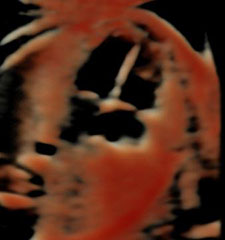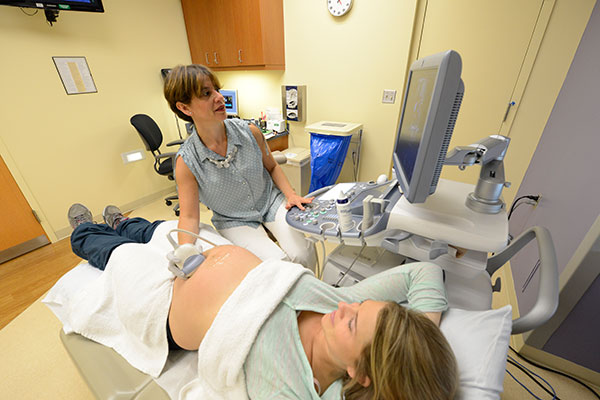 Evaluation by the Fetal Heart Program
Evaluation by the Fetal Heart Program
Q: Why do I need a fetal heart evaluation?
There are many reasons why your primary obstetrician or maternal-fetal medicine specialist may want you to et an evaluation of your baby’s heart. Some of the common reasons include:
- If a sibling or parent was born with a heart defect.
- A family history of multiple individuals born with a heart defect, such as parents, aunts or uncles, or grandparents.
- A chromosomal or genetic abnormality discovered in the fetus.
- If a mother has taken certain medications that may cause heart defects during pregnancy, such as anti-seizure medications or prescription acne medications.
- If the mother has abused alcohol or drugs during pregnancy.
- If a mother has diabetes, phenylketonuria, or a connective tissue disease, such as lupus.
- If the mother has had rubella or certain other viruses during pregnancy.
- A routine prenatal ultrasound has discovered possible heart abnormalities.
- A routine prenatal ultrasound has identified problems with any other parts of the baby
Q: What will be done at my first visit?
A:In most cases, your evaluation by the Fetal Heart Program will start at the Center for Advanced Fetal Care. After you register for your test, you will be asked a series of routine questions about your pregnancy and general health. This helps us to ensure we take all the steps necessary to provide a complete evaluation of your baby’s heart. The test itself may take anywhere from 30 minutes to one hour and depends on how easily we are able to obtain clear images of the heart.
 A fetal echocardiogram is then performed by a member of our team, a sonographer, fellow or physician, who has been specially trained to perform this evaluation. Because we are examining the baby within the womb, the image quality is very dependent upon the position and activity of the baby. To improve the images, during this test you may be asked to empty your bladder, move from side-to-side or even take a brief walk. You may eat or drink be-fore this test and it is not necessary to have a full bladder. For these reasons, a longer test does not imply that there is a heart problem.
A fetal echocardiogram is then performed by a member of our team, a sonographer, fellow or physician, who has been specially trained to perform this evaluation. Because we are examining the baby within the womb, the image quality is very dependent upon the position and activity of the baby. To improve the images, during this test you may be asked to empty your bladder, move from side-to-side or even take a brief walk. You may eat or drink be-fore this test and it is not necessary to have a full bladder. For these reasons, a longer test does not imply that there is a heart problem.
During the test, the sonographer or fellow will not give you the results. After your test is complete, the person per-forming your scan will review the images with one of the physician members of our team. The physician may choose to obtain more images at this time. After all of the images are obtained, the doctor will review the results of the test with you. A follow-up evaluation may also be arranged at this time. Other testing may be recommended by your doctor.
As this may be a stressful time for you, we would recommend that your partner or another family member accom-pany you to this appointment. We do not recommend bringing small children with you to your echocardiogram.
Q: What if there is a heart problem?
A:After every test, a doctor will speak with you and explain the results.
At times imaging can be difficult because of the position of the baby, difficult image quality, low amniotic fluid or placental position. For these reasons, we are not always able to see the developing baby’s heart in as much detail as we would like. In these cases we may book a follow-up test to reassess the heart. This does not mean that there is a heart problem.
If an abnormality is detected, a doctor will speak with you and your partner privately. During this time, we will provide you with as much detailed information about the heart problem as can be determined from the images. The effect of the heart problem on the pregnancy and birth will be discussed. All options available for the pregnancy will be discussed. Other members of the team, such as the cardiac nurse coordinator, who has experience with families experiencing heart problems in babies and children, social worker will participate in discussions at the time of the appointment or afterwards.
In addition we will schedule you an appointment with pediatric cardiology where they will also assess your baby’s heart at least once before delivery. They will be the team assessing your baby’s heart after birth. You may also meet with a neonatologist; these are pediatricians with special training in caring for babies who may need special care after birth. We will also arrange an appointment to meet with a pediatric cardiac surgeon if we think your baby may require surgery after birth.
Q: What are the roles of different providers in this process?
Perinatologists:
Take care of the mother and fetus at higher than normal risks for complications. Some of the perinatologists are trained to evaluate fetal heart in the womb as early as 12 weeks of gestation. If the patient has a high risk of having a baby with heart defects based on their family history or on regular obstetric ultra-sound finding, she will be referred to a perinatologist for a detailed echocardiography. Usually, a perinatolo-gist is the first doctor who is going to explain the heart defect to the patient. A perinatologist will also assess the fetus and give information about other abnormalities if present. He/she will be responsible for follow-ups and delivery plannings.
Learn more about the perinatologists and Center for Advanced Fetal Care at UMMC
Pediatric cardiologists:
Take care of children with any kind of heart problem. Some pediatric cardiologists are trained to evaluate heart problems before birth. The information that is discovered by a fetal echocardio-gram helps the cardiologist to predict what will happen after birth. Not only will the cardiologist explain to you what is wrong with the baby’s heart, he/she will explain what will happen to the baby after birth, what surgery or treatment will be needed, and how this heart problem will be managed over the baby’s lifetime. A pediatric cardiologist will follow your baby after birth and throughout their childhood.
Learn more about the Children’s Heart Program at UMMC
Pediatric cardiac surgeons:
Specialize in operating on the types of heart problems that happen in babies and children. They work closely with the team to care for infants with congenital heart defects both before and after surgery. Before birth or before the surgery, the surgeon will explain all the details about the operation and what the expected outcome is.
Neonatologists:
Will monitor and stabilize your baby while the heart doctors and surgeons learn more about your baby’s heart. They take care of any other health problems that your baby may have. They will focus on the daily needs of your baby and organize the care your baby needs when he or she is ready to leave the neo-natal intensive care unit (NICU). They will help plan the safest time and place to deliver your baby. They can also talk to you about caring for your baby without surgery, in some cases.
Learn more about the neonatologists and NICU at UMMC
Genetic counselor:
The primary role of the genetic counselor in the Fetal Heart Program is to work with families to try to figure out the cause for a developing baby’s heart defect. Figuring out whether a baby’s heart defect was caused by a chromosome condition or a genetic syndrome can help us determine whether the baby is likely to have medical or developmental problems in addition to the heart defect. The genetic counselor will gather medical and family history information from the family and will also provide the family with information about various testing options. If the baby is found to have a genetic condition, the genetic counselor can speak with the family in detail about the causes and symptoms of that disorder as well as the chances that other family members or future children might have the same disorder.

